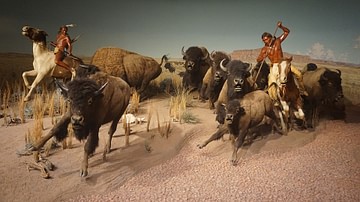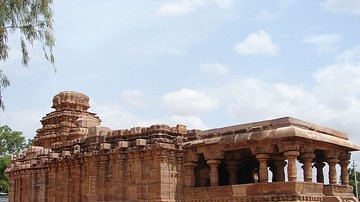Search
Search Results

Definition
Bimbisara
Bimbisara (c. 545/544 BCE - c. 493/492 BCE) was a king of the Magadha Kingdom who is credited with establishing imperial dominance in the Indian subcontinent. Son of a minor king called Bhattiya, he belonged to the Haryanka Dynasty, which...

Definition
Northern Cheyenne Exodus
The Northern Cheyenne Exodus (1878-1879) is the modern-day term for the attempt by the Northern Cheyenne under chiefs Morning Star (Dull Knife, l. c. 1810-1883) and Little Wolf (also known as Little Coyote, l. c. 1820-1904) to leave the Southern...

Definition
Delhi Durbar
The Delhi Durbar was a spectacular public event held in India to commemorate the accession of a new British monarch to the title Empress or Emperor of India. Three Delhi Durbars were held: 1877, 1903, and 1911. The event involved military...

Video
Saynday Meets Smallpox | Kiowa Folklore (Native American Indian Folklore)
Don't forget to subscribe and leave a like. If you have any more to add, want to correct me, or leave what you thought comment below. This is a bit more of a serious video. I first read this story about 2 years ago and it's stuck with...

Article
Buffalo and the Plains Indians
The buffalo were essential to the Plains Indians, and other Native American nations, as they were not only a vital food source but were regarded as a sacred gift the Creator had provided especially for the people. Buffalo (bison) supplied...

Article
Eastman's Account and Media Coverage of the Wounded Knee Massacre
Of the many first-person accounts of the aftermath of the Wounded Knee Massacre, the report by Sioux author and physician Charles A. Eastman (also known as Ohiyesa, l. 1858-1939) is among the best-known. Eastman describes his experiences...

Definition
Germanicus
Germanicus (15 BCE - 19 CE) was a commander in the Roman Empire with a glowing reputation in his time under the rule of the Emperor Tiberius. His position in the Roman Empire was a unique and important one. His marriage to Agrippina the Elder...

Definition
Rashtrakuta Dynasty
The Rashtrakuta Dynasty ruled parts of South India from the 8th to the 10th century CE. At its zenith, their kingdom included the modern state of Karnataka in its entirety along with parts of the current Indian states of Tamil Nadu, Andhra...

Definition
Romani
Romani is an umbrella term used to describe a diverse ethnolinguistic group of people with a historical presence in Europe and West Asia. The historically common term 'Gypsy' is based on the myth that they came from Egypt. In reality, the...

Definition
Periplus of the Erythraean Sea
The Periplus of the Erythraean Sea is an eyewitness account of ancient travel to Africa and India via the Red Sea written by an unknown Greek-speaking Egyptian author in the 1st century CE. In this detailed account, the conditions of the...